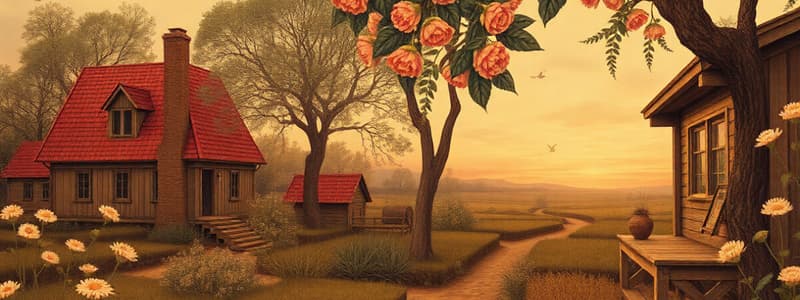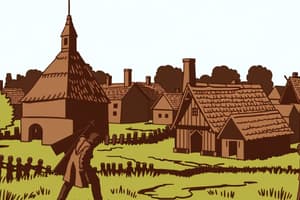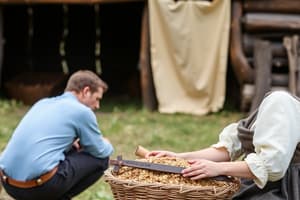Podcast
Questions and Answers
What was the primary task of colonists on their farms?
What was the primary task of colonists on their farms?
- Building complex structures
- Harvesting crops and selling goods
- Clearing the land of trees (correct)
- Producing textiles for sale
What was a common feature of colonial homes?
What was a common feature of colonial homes?
- Complex architectural designs
- Multiple bathrooms
- Separate living quarters for children
- A single large room with a chimney (correct)
What was a major challenge faced by colonists while cooking?
What was a major challenge faced by colonists while cooking?
- Availability of fresh ingredients
- Keeping the fire going without matches (correct)
- Managing an electric stove
- Using advanced kitchen appliances
What does a trundle bed allow families to do in colonial homes?
What does a trundle bed allow families to do in colonial homes?
Which of the following was typically not a task for a colonial family?
Which of the following was typically not a task for a colonial family?
What was the main outcome of the Magna Carta signed in 1215?
What was the main outcome of the Magna Carta signed in 1215?
How did the colonists view the Glorious Revolution?
How did the colonists view the Glorious Revolution?
What major agreement did William of Orange and Mary accept in 1689?
What major agreement did William of Orange and Mary accept in 1689?
What right did the colonists from the 13 colonies most cherish?
What right did the colonists from the 13 colonies most cherish?
Which event in 1685 led to the call for a bloodless revolution?
Which event in 1685 led to the call for a bloodless revolution?
What was the primary function of the waterfront in colonial cities?
What was the primary function of the waterfront in colonial cities?
Which of the following best describes the environment of colonial cities?
Which of the following best describes the environment of colonial cities?
What types of goods were typically sold at the marketplace?
What types of goods were typically sold at the marketplace?
What was a common lighting source used by colonists at home?
What was a common lighting source used by colonists at home?
How did colonists typically respond to a fire in the town?
How did colonists typically respond to a fire in the town?
What materials were commonly used in the construction of city homes?
What materials were commonly used in the construction of city homes?
Which characteristic was true about the size of colonial cities compared to modern standards?
Which characteristic was true about the size of colonial cities compared to modern standards?
What type of work did craftsmen in colonial cities perform?
What type of work did craftsmen in colonial cities perform?
Flashcards are hidden until you start studying
Study Notes
Life on a Colonial Farm
- Farmers relied heavily on farming, commerce, and crafts.
- Most families lived on small farms and produced most of what they needed.
- The primary task was clearing the land of trees using simple tools like axes and saws.
- Colonial homes were generally simple with one room and a chimney.
- Fireplaces were the primary source of heat for warmth and cooking.
- Daily life began before dawn with chores like tending crops, animals, and preparing food.
- Other tasks included spinning, sewing, candle making, and cleaning.
Colonial Rights
- Colonists viewed themselves as English citizens and expected the same rights.
- The most crucial right was to have a voice in their government.
- The Magna Carta established that the monarch's power was limited and even the king was not above the law.
- The founding of Parliament was another key victory, becoming a lawmaking body responsible for approving laws and taxes.
- The Glorious Revolution forced James II off the throne for attempting to rule without Parliament.
- The English Bill of Rights stated that the power to create laws and levy taxes belonged to elected representatives in Parliament.
Life in Colonial Cities
- In 1750, one in twenty colonists lived in a city.
- Cities were exciting places compared to the quiet farm life.
- The waterfront was the heart of the city, where ships brought news and goods from England.
- Just beyond the docks, a marketplace bustled with merchants selling fresh produce and fish.
- Taverns served food and drink, and were places where people gathered to exchange news and gossip.
- Shops lined the streets, with craftspeople turning out goods based on the latest designs from England.
- Cities were noisy and smelly, with carts clattering over cobblestones and the stench of rotting garbage and open sewers.
- Animals ran loose in the street, and flies and mosquitoes swarmed during hot weather.
- City homes were built of wood with thatched roofs and small windows because glass was costly.
- For lighting, colonists used torches, grease lamps, and candles.
- Fire was a constant danger, and colonists kept fire buckets hanging by their doors.
- Colonial cities were small by today's standards, with Boston and Philadelphia having fewer than 20,000 people in 1700.
Studying That Suits You
Use AI to generate personalized quizzes and flashcards to suit your learning preferences.




